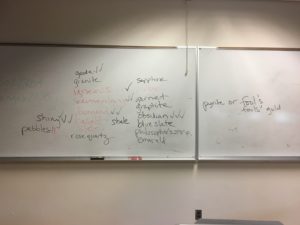Although it is hard to understand at times, The Libretto for the Republic of Liberia is a condemnation of Western colonialism and imperialism and a celebration of Libera as an African nation. The first stanza which reads, “Liberia?/No micro-footnote in a bunioned book/Homed by a pendant/With a gelded look:/You are/The ladder of survival dawn men saw/In the quicksilver sparrow that slips/The eagle’s claw!” (Tolson) seems to be a recognition of Libera’s greatness in spite of slavery and colonialism. the line “No micro-footnote in a bunioned book,” speaks to Tolson’s belief that Liberia is a country to be remembered, while the lines “The ladder of survival dawn men saw/In the quicksilver sparrow that slips/The eagle’s claw!” seem to speak to Tolson’s celebration of Liberia’s freedom from Western domination. He is speaking about the greatness of an African country that has overcome subordination on the part of the West, which most definitely aligns with the values of Afrofuturism.
I began to become confused with the poem beginning with the section that reads, “The Futurafrique, the chef d’oeuvre of Liberian/Motors slips through the traffic/swirl of axial Parsi-Feirefiz/Square, slithers past the golden/statues of the half-brother as/brothers, with cest prace…” (Tolson). At first, I could not understand any reference in this stanza, but upon further investigation, I found that Tolson wrote this poem to celebrate the centennial of the founding of Liberia. In this context, I read this stanza as a look into modern-day Liberia, as Tolson ties the first section of the poem, which talks about a more archaic Libera, to this new section of the poem, which discusses a thriving, contemporary Libera that has withstood the test of time. He clearly discusses the relationship between history and the future.

